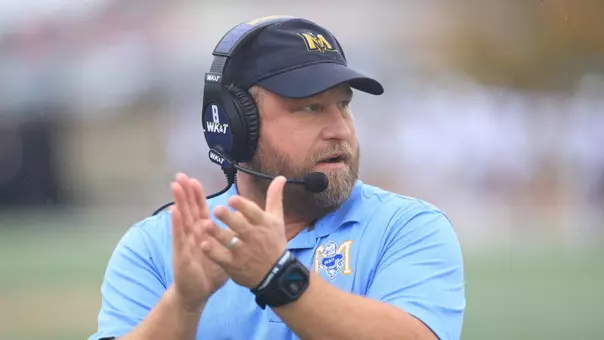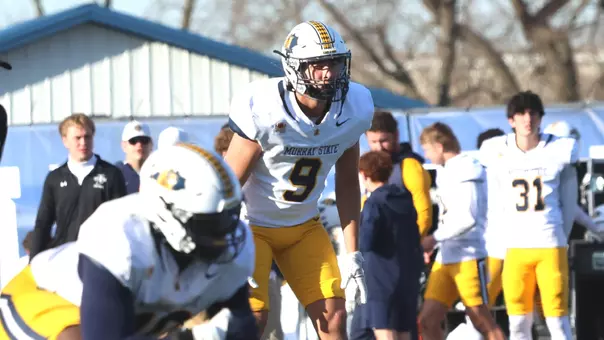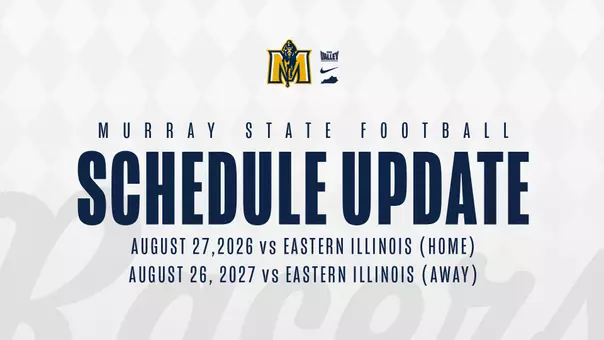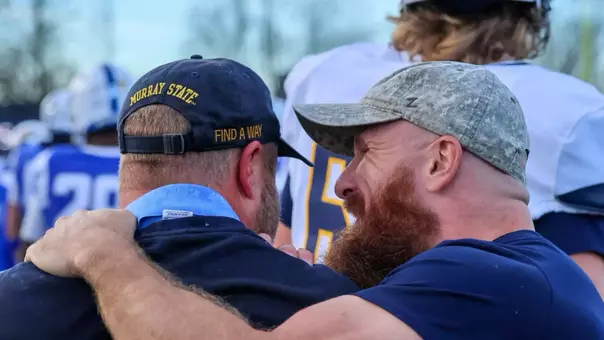Murray State University Athletics
Football
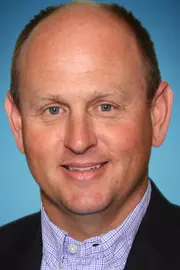
Chris Hatcher
- Title:
- Head Coach
- Email:
- msu.football@murraystate.edu
- Phone:
- (270) 809-6181
@HatchAttack1
Very few schools in the country can boast the kind of coaching tradition that has taken up residence at Murray State University, especially in the last 35 years. Consider the men who in recent history have guided the Racers on the football field:
• Mike Gottfried left Murray State to coach at Kansas and Pittsburgh before becoming one of the top college football television analysts in the country while working for ESPN.
• Frank Beamer left Murray State for his alma mater, Virginia Tech, where he guided the Hokies to a spot in the national championship game against Florida State in 2000, earning several national coach of the year awards.
• Houston Nutt took the Racers to unprecedented heights before leaving to restore the winning tradition at Arkansas and Ole Miss.
Now the torch is carried by a coach who has proven to be a winner and has all the makings of becoming the next Murray State football head coaching legend...Chris Hatcher.
The Chris Hatcher era officially began at Murray State, Dec. 21, 2009, when Director of Athletics Allen Ward introduced Hatcher as the 17th head coach in front of a standing-room only crowd inside the Murray Room.
Success has followed Hatcher throughout his career, as the former Division II National Player of the Year has garnered an overall record of 118-48 in his 14 years as a head coach. Included in those 14 seasons are six trips to the postseason, two appearances in the National Championship game and the 2004 Division II National Championship.
Hatcher’s wide-open style of offense, known as the ‘Hatch Attack,’ quickly won the hearts of the Murray community, while giving opposing defensive coordinators nightmares.
Since arriving on campus, Hatcher has returned the Racer program back to its winning tradition, while also transforming Stewart Stadium into one of the premiere facilities in the country.
Hatcher and his coaching staff have been busy renovating the locker room, film room and weight room, while also building a new players lounge, equipped with all the top gaming devices, pool table and computers for school work and watching film.
This past spring, Hatcher completed the Hall of Fame Room, honoring all the greats in Racer history. The room features a plaque for all the All-Americans, as well as the “Big Win” wall, recognizing all the big wins throughout the history of Racer football.
On the field, Hatcher has led the Racers to 24 victories in four seasons, nearly equalling the number of wins the program had in the previous seven seasons before his arrival. In fact, Hatcher has three seasons with at least six victories, matching the total from the 10 years prior.
The success of Hatcher can be traced back to his offense. Under Hatcher, the Racers have boasted one of the top offenses in the FCS. MSU has ranked in the top five in passing offense and total offense in three of the last four seasons.
Individual success has also been synonomous with Hatcher’s arrival as the Racers have had at least one All-America in each of his four seasons.
The Racers made history in 2013 as they knocked off Jacksonville State and Eastern Kentucky, both in overtime, in the same season for the first time in school history.
MSU used a balanced attack in 2013. The Racers rushed the ball 424 times, while throwing it 458, in averaging 398.6 yards of offense.
The offense was spearheaded by All-America wide receiver Walter Powell, who hauled in 66 passes for 837 yards and 13 touchdowns in just 10 games.
In his first three years at MSU, the Racer offense has rewritten the record books. Powered by the first All-American quarterback in school history, Casey Brockman, the Racers set 21 single-game records and have bolstered three of the top five passing offenses in school history.
For the third-straight season, the 2012 Racer offense was tops in the Ohio Valley Conference. MSU averaged a school record 484.4 yards of offense per game, while also setting a new single-season record by averaging 348.9 yards through the air.
The offense was again led by Brockman, who finished sixth in the voting for the Walter Payton Award. Brockman closed out his career by throwing for a school record 3,729 yards and 29 touchdowns.
His favorite target was wide receiver Walter Powell. The First-Team All-American selection had a record-breaking season of his own as he caught 94 passes for 1,213 yards and 10 touchdowns.
The 2011 season saw the Racers go 7-4 and post back-to-back winning seasons for the first time since the 1999-2000 seasons. MSU closed the season winning five of their final six games, including going on the road and knocking off nationally-ranked Tennessee Tech.
The Racer offense was among the most prolific in the nation as MSU ranked third in scoring offense, fourth in total offense and seventh in passing offense. The 5,070 yards of total offense marked the fifth time in school history the Racers amassed over 5,000 yards, while the 460.9 yards per game were the third-most all time.
The Racers also rushed for 152.27 yards per game, with Mike Harris accumulating seven 100-yard rushing performances on his way to becoming the 10th 1,000-yard rusher in school history.
The defense was not to be outdone as the Racers recorded their first shutout in seven years with a 39-0 victory over Mississippi Valley State. It also marked the first shutout on the road since 1986, and the first non-conference road shutout since the 1979 season.
In 2010, the Racer offense led the OVC in passing offense, total offense and scoring offense, while ranking fourth nationally in passing offense, fifth in total offense and fifth in scoring offense.
Hatcher is also one that is not scared to roll the dice as the Racers attempted and converted more fourth-down conversions than any other team in the FCS.
After getting off to a slow start, Hatcher led the Racers to a 52-16 victory over UT Martin that paved the way for a season-ending stretch that saw MSU win six of its final eight games.
The ‘Hatch Attack’ was on fully display on Homecoming as the Racers set a modern-day scoring record, while racking up 816 yards in a thrilling come-from-behind, 72-59, victory over Missouri State. The offensive explosion helped the Racers set 25 school, conference or NCAA records, including becoming the first school in FCS history to have a 500-yard passer, 200-yard receiver and a 200-yard rusher in the same game.
Quarterback Casey Brockman, making his first start of the season, threw for a school-record 570 yards and seven touchdowns. Wide receiver Marcus Harris hauled in nine passes for 213 yards and a school-record five touchdowns, while running back Mike Harris had 30 carries for 212 yards and two touchdowns.
The Racers went on to win the final three games of the season, outscoring their opponents, 133-71. MSU finished the season with a 6-5 record, 5-3 in the OVC, to secure the first winning season since 2004.
The victory over Tennessee State in the season finale was the 100th in the career for Hatcher. The victory made Hatcher the fifth youngest coach, youngest in the 21st century, to record 100 coaching victories. At 37 years and 274 days at the time of the victory, Hatcher ranks just behind Pop Warner and ahead of Amos Alonso Stagg.
Hatcher came to MSU after a three-year stint at Georgia Southern, where he led the Eagles to an 18-15 record and a 12-11 mark in the competitive Southern Conference.
In his first season with the Eagles in 2007, Hatcher led GSU to the second-best regular season turnaround in program history, a plus-4 improvement from 2006. The Eagles ranked among the national leaders in various categories on offense, defense and special teams. He also coached five All-America players, including quarterback Jayson Foster, the second Walter Payton award winner at GSU.
The Eagles returned to the national rankings after a 14-week hiatus as the Hatcher era got off to a 4-1 start. GSU climbed as high as No. 11, after the Eagles recorded three-straight victories at No. 5 Appalachian State, ending the Mountaineers 30-game home winning streak, at home against No. 25 The Citadel and at No. 10 Wofford.
The prolific offense ranked first in rushing, eighth in total offense, eighth in scoring offense and 23rd in sacks allowed. The defense was 14th in turnover margin and 17th in fumbles recovered, while the special teams ranked 25th in net punting.
The 2008 season saw Hatcher guide the Eagles to the program’s 25th winning season in 27 years.
In late October, the Eagles set an NCAA record for the largest fourth-quarter comeback as GSU erased a 31-3 deficit for a thrilling 38-31 overtime victory at Western Carolina. The OT contest was just the first of an NCAA record four overtime games played by the Eagles in 2008.
The ‘Hatch Attack’ provided impressive numbers in all three phases. The offense ranked 20th nationally in passing and scoring, while the defense ranked 26th in sacks and 22nd in tackles-for-loss. The special teams units finished 14th in punt returns and 36th in kickoff returns.
All of this was done as Hatcher and his staff were forced to play in upwards of 30 freshman on a consistent basis throughout the season. In all, five Eagles received all-league honors and seven freshman representing offense, defense and special teams were named to the inaugural SoCon All-Freshman Team.
Prior to his time at GSU, Hatcher molded Valdosta State into one of the most dominant teams in Division II.
The winningest coach in Blazers’ history, Hatcher was 76-12 at his alma mater. When Hatcher took over as head coach in 2000, he wasted no time molding the Valdosta State program into the ‘Hatch Attack’. In his first year back at VSU, Hatcher took a 4-7 squad the previous year and turned it around to a 10-2 record (8-1 in GSC action) and a berth in the Division II playoffs. He coached quarterback Dusty Bonner, who was a two-time winner of the Harlon Hill Trophy as the NCAA Division II Player of the Year, an award Hatcher won himself in 1994.
His 2001 and 2002 teams posted back-to-back undefeated records during the regular season, part of a Gulf South Conference record 35 straight victories during the regular season.
During the 2004 championship season, the Blazers lost their season-opener before rattling off 13 consecutive victories, capped by a 36-31 victory over Pittsburg State in the title game. Hatcher was named ‘National Coach of the Year’ by the American Football Coaches Association and was the offensive coordinator for the East squad at the Hula Bowl.
In 2005, Valdosta opened the season ranked No. 1 for four-straight weeks and saw the season culminate with a sixth-straight NCAA postseason appearance. Despite an 8-2 record in 2006, the 10th-ranked Blazers did not receive an invitation to the playoffs, marking the first time that occurred in the Hatcher era.
The 2006 team finished sixth nationally in passing offense (283 yards per game), 12th in scoring offense (34.9 ppg) and 19th in total offense (389.9 yards). However, Hatcher’s teams have been successful in all three facets. The 2006 defense ranked 27th nationally in scoring defense (15.7 points allowed) while the special teams ranked third in punt returns (17.3 yards) and blocked seven kicks.
The Macon (Ga.) native spent one year as quarterbacks/tight ends coach at the University of Central Florida where he worked with Miami Dolphins quarterback Daunte Culpepper. He then spent three years working with the quarterbacks at the University of Kentucky where he worked under former VSU head coach Hal Mumme. During his time with the Wildcats, he coached the No. 1 NFL draft pick, All-America quarterback Tim Couch.
While at UK, Hatcher and the Wildcats played in the 1999 Outback Bowl, the program’s first New Year’s Day Bowl in 47 years, then followed that the following year with a berth in the ’99 Music City Bowl. It marked the first time the Wildcats had consecutive bowl appearances in 15 years.
Hatcher carried his success on the playing field to help him develop into one of the nation’s winningest coaches. A two-time All-American quarterback at VSU (1993 and 1994), Hatcher threw for 11,363 yards and 121 touchdowns during his stellar career. During his senior year in 1994, he led the Blazers to their first postseason berth, advancing to the quarterfinals, and when it was all said and done set 29 VSU passing and total offense records.
Among the national records he once set were a 68.5 career completion percentage and streak of 20-straight completions in a game against New Haven. Hatcher held 14 Valdosta State, 13 Gulf South Conference and 17 Division II national records. He also started 41 consecutive games, posting a 29-10-2 record.
Not only did Hatcher excel on the field, he was just as successful in the classroom. Twice he received the Gulf South Conference’s Commissioner’s Trophy which is awarded to the league’s Most Outstanding Student-Athlete. He finished his senior year by winning several national honors including: the NCAA Top Eight Award, the CoSIDA Academic All-America National Player of the Year and a postgraduate scholarship from the National Football Foundation and College Football Hall of Fame.
At the time when Hatcher won the Harlon Hill Trophy, he won by the second-largest voting margin in the then-19-year history of the award. Hatcher was also voted the GSC Football team of the 1990s.
The honors continued to add up even after his playing days. Hatcher was named to the Valdosta State University Athletic Hall of Fame in 2001, in his first year of eligibility. The personable head coach was also elected into the Macon Sports Hall of Fame the same year.
In 2005, Hatcher was inducted into the Division II Hall of Fame. This past summer, Hatcher was inducted into the inaugural class of the GSC Hall of Fame.
Hatcher graduated from Valdosta State in 1995 with a bachelor’s degree in health and physical education.
He and his wife, Lori, also a graduate of VSU, are the parents of a son, Ty, and daughter, Talley.
Very few schools in the country can boast the kind of coaching tradition that has taken up residence at Murray State University, especially in the last 35 years. Consider the men who in recent history have guided the Racers on the football field:
• Mike Gottfried left Murray State to coach at Kansas and Pittsburgh before becoming one of the top college football television analysts in the country while working for ESPN.
• Frank Beamer left Murray State for his alma mater, Virginia Tech, where he guided the Hokies to a spot in the national championship game against Florida State in 2000, earning several national coach of the year awards.
• Houston Nutt took the Racers to unprecedented heights before leaving to restore the winning tradition at Arkansas and Ole Miss.
Now the torch is carried by a coach who has proven to be a winner and has all the makings of becoming the next Murray State football head coaching legend...Chris Hatcher.
The Chris Hatcher era officially began at Murray State, Dec. 21, 2009, when Director of Athletics Allen Ward introduced Hatcher as the 17th head coach in front of a standing-room only crowd inside the Murray Room.
Success has followed Hatcher throughout his career, as the former Division II National Player of the Year has garnered an overall record of 118-48 in his 14 years as a head coach. Included in those 14 seasons are six trips to the postseason, two appearances in the National Championship game and the 2004 Division II National Championship.
Hatcher’s wide-open style of offense, known as the ‘Hatch Attack,’ quickly won the hearts of the Murray community, while giving opposing defensive coordinators nightmares.
Since arriving on campus, Hatcher has returned the Racer program back to its winning tradition, while also transforming Stewart Stadium into one of the premiere facilities in the country.
Hatcher and his coaching staff have been busy renovating the locker room, film room and weight room, while also building a new players lounge, equipped with all the top gaming devices, pool table and computers for school work and watching film.
This past spring, Hatcher completed the Hall of Fame Room, honoring all the greats in Racer history. The room features a plaque for all the All-Americans, as well as the “Big Win” wall, recognizing all the big wins throughout the history of Racer football.
On the field, Hatcher has led the Racers to 24 victories in four seasons, nearly equalling the number of wins the program had in the previous seven seasons before his arrival. In fact, Hatcher has three seasons with at least six victories, matching the total from the 10 years prior.
The success of Hatcher can be traced back to his offense. Under Hatcher, the Racers have boasted one of the top offenses in the FCS. MSU has ranked in the top five in passing offense and total offense in three of the last four seasons.
Individual success has also been synonomous with Hatcher’s arrival as the Racers have had at least one All-America in each of his four seasons.
The Racers made history in 2013 as they knocked off Jacksonville State and Eastern Kentucky, both in overtime, in the same season for the first time in school history.
MSU used a balanced attack in 2013. The Racers rushed the ball 424 times, while throwing it 458, in averaging 398.6 yards of offense.
The offense was spearheaded by All-America wide receiver Walter Powell, who hauled in 66 passes for 837 yards and 13 touchdowns in just 10 games.
In his first three years at MSU, the Racer offense has rewritten the record books. Powered by the first All-American quarterback in school history, Casey Brockman, the Racers set 21 single-game records and have bolstered three of the top five passing offenses in school history.
For the third-straight season, the 2012 Racer offense was tops in the Ohio Valley Conference. MSU averaged a school record 484.4 yards of offense per game, while also setting a new single-season record by averaging 348.9 yards through the air.
The offense was again led by Brockman, who finished sixth in the voting for the Walter Payton Award. Brockman closed out his career by throwing for a school record 3,729 yards and 29 touchdowns.
His favorite target was wide receiver Walter Powell. The First-Team All-American selection had a record-breaking season of his own as he caught 94 passes for 1,213 yards and 10 touchdowns.
The 2011 season saw the Racers go 7-4 and post back-to-back winning seasons for the first time since the 1999-2000 seasons. MSU closed the season winning five of their final six games, including going on the road and knocking off nationally-ranked Tennessee Tech.
The Racer offense was among the most prolific in the nation as MSU ranked third in scoring offense, fourth in total offense and seventh in passing offense. The 5,070 yards of total offense marked the fifth time in school history the Racers amassed over 5,000 yards, while the 460.9 yards per game were the third-most all time.
The Racers also rushed for 152.27 yards per game, with Mike Harris accumulating seven 100-yard rushing performances on his way to becoming the 10th 1,000-yard rusher in school history.
The defense was not to be outdone as the Racers recorded their first shutout in seven years with a 39-0 victory over Mississippi Valley State. It also marked the first shutout on the road since 1986, and the first non-conference road shutout since the 1979 season.
In 2010, the Racer offense led the OVC in passing offense, total offense and scoring offense, while ranking fourth nationally in passing offense, fifth in total offense and fifth in scoring offense.
Hatcher is also one that is not scared to roll the dice as the Racers attempted and converted more fourth-down conversions than any other team in the FCS.
After getting off to a slow start, Hatcher led the Racers to a 52-16 victory over UT Martin that paved the way for a season-ending stretch that saw MSU win six of its final eight games.
The ‘Hatch Attack’ was on fully display on Homecoming as the Racers set a modern-day scoring record, while racking up 816 yards in a thrilling come-from-behind, 72-59, victory over Missouri State. The offensive explosion helped the Racers set 25 school, conference or NCAA records, including becoming the first school in FCS history to have a 500-yard passer, 200-yard receiver and a 200-yard rusher in the same game.
Quarterback Casey Brockman, making his first start of the season, threw for a school-record 570 yards and seven touchdowns. Wide receiver Marcus Harris hauled in nine passes for 213 yards and a school-record five touchdowns, while running back Mike Harris had 30 carries for 212 yards and two touchdowns.
The Racers went on to win the final three games of the season, outscoring their opponents, 133-71. MSU finished the season with a 6-5 record, 5-3 in the OVC, to secure the first winning season since 2004.
The victory over Tennessee State in the season finale was the 100th in the career for Hatcher. The victory made Hatcher the fifth youngest coach, youngest in the 21st century, to record 100 coaching victories. At 37 years and 274 days at the time of the victory, Hatcher ranks just behind Pop Warner and ahead of Amos Alonso Stagg.
Hatcher came to MSU after a three-year stint at Georgia Southern, where he led the Eagles to an 18-15 record and a 12-11 mark in the competitive Southern Conference.
In his first season with the Eagles in 2007, Hatcher led GSU to the second-best regular season turnaround in program history, a plus-4 improvement from 2006. The Eagles ranked among the national leaders in various categories on offense, defense and special teams. He also coached five All-America players, including quarterback Jayson Foster, the second Walter Payton award winner at GSU.
The Eagles returned to the national rankings after a 14-week hiatus as the Hatcher era got off to a 4-1 start. GSU climbed as high as No. 11, after the Eagles recorded three-straight victories at No. 5 Appalachian State, ending the Mountaineers 30-game home winning streak, at home against No. 25 The Citadel and at No. 10 Wofford.
The prolific offense ranked first in rushing, eighth in total offense, eighth in scoring offense and 23rd in sacks allowed. The defense was 14th in turnover margin and 17th in fumbles recovered, while the special teams ranked 25th in net punting.
The 2008 season saw Hatcher guide the Eagles to the program’s 25th winning season in 27 years.
In late October, the Eagles set an NCAA record for the largest fourth-quarter comeback as GSU erased a 31-3 deficit for a thrilling 38-31 overtime victory at Western Carolina. The OT contest was just the first of an NCAA record four overtime games played by the Eagles in 2008.
The ‘Hatch Attack’ provided impressive numbers in all three phases. The offense ranked 20th nationally in passing and scoring, while the defense ranked 26th in sacks and 22nd in tackles-for-loss. The special teams units finished 14th in punt returns and 36th in kickoff returns.
All of this was done as Hatcher and his staff were forced to play in upwards of 30 freshman on a consistent basis throughout the season. In all, five Eagles received all-league honors and seven freshman representing offense, defense and special teams were named to the inaugural SoCon All-Freshman Team.
Prior to his time at GSU, Hatcher molded Valdosta State into one of the most dominant teams in Division II.
The winningest coach in Blazers’ history, Hatcher was 76-12 at his alma mater. When Hatcher took over as head coach in 2000, he wasted no time molding the Valdosta State program into the ‘Hatch Attack’. In his first year back at VSU, Hatcher took a 4-7 squad the previous year and turned it around to a 10-2 record (8-1 in GSC action) and a berth in the Division II playoffs. He coached quarterback Dusty Bonner, who was a two-time winner of the Harlon Hill Trophy as the NCAA Division II Player of the Year, an award Hatcher won himself in 1994.
His 2001 and 2002 teams posted back-to-back undefeated records during the regular season, part of a Gulf South Conference record 35 straight victories during the regular season.
During the 2004 championship season, the Blazers lost their season-opener before rattling off 13 consecutive victories, capped by a 36-31 victory over Pittsburg State in the title game. Hatcher was named ‘National Coach of the Year’ by the American Football Coaches Association and was the offensive coordinator for the East squad at the Hula Bowl.
In 2005, Valdosta opened the season ranked No. 1 for four-straight weeks and saw the season culminate with a sixth-straight NCAA postseason appearance. Despite an 8-2 record in 2006, the 10th-ranked Blazers did not receive an invitation to the playoffs, marking the first time that occurred in the Hatcher era.
The 2006 team finished sixth nationally in passing offense (283 yards per game), 12th in scoring offense (34.9 ppg) and 19th in total offense (389.9 yards). However, Hatcher’s teams have been successful in all three facets. The 2006 defense ranked 27th nationally in scoring defense (15.7 points allowed) while the special teams ranked third in punt returns (17.3 yards) and blocked seven kicks.
The Macon (Ga.) native spent one year as quarterbacks/tight ends coach at the University of Central Florida where he worked with Miami Dolphins quarterback Daunte Culpepper. He then spent three years working with the quarterbacks at the University of Kentucky where he worked under former VSU head coach Hal Mumme. During his time with the Wildcats, he coached the No. 1 NFL draft pick, All-America quarterback Tim Couch.
While at UK, Hatcher and the Wildcats played in the 1999 Outback Bowl, the program’s first New Year’s Day Bowl in 47 years, then followed that the following year with a berth in the ’99 Music City Bowl. It marked the first time the Wildcats had consecutive bowl appearances in 15 years.
Hatcher carried his success on the playing field to help him develop into one of the nation’s winningest coaches. A two-time All-American quarterback at VSU (1993 and 1994), Hatcher threw for 11,363 yards and 121 touchdowns during his stellar career. During his senior year in 1994, he led the Blazers to their first postseason berth, advancing to the quarterfinals, and when it was all said and done set 29 VSU passing and total offense records.
Among the national records he once set were a 68.5 career completion percentage and streak of 20-straight completions in a game against New Haven. Hatcher held 14 Valdosta State, 13 Gulf South Conference and 17 Division II national records. He also started 41 consecutive games, posting a 29-10-2 record.
Not only did Hatcher excel on the field, he was just as successful in the classroom. Twice he received the Gulf South Conference’s Commissioner’s Trophy which is awarded to the league’s Most Outstanding Student-Athlete. He finished his senior year by winning several national honors including: the NCAA Top Eight Award, the CoSIDA Academic All-America National Player of the Year and a postgraduate scholarship from the National Football Foundation and College Football Hall of Fame.
At the time when Hatcher won the Harlon Hill Trophy, he won by the second-largest voting margin in the then-19-year history of the award. Hatcher was also voted the GSC Football team of the 1990s.
The honors continued to add up even after his playing days. Hatcher was named to the Valdosta State University Athletic Hall of Fame in 2001, in his first year of eligibility. The personable head coach was also elected into the Macon Sports Hall of Fame the same year.
In 2005, Hatcher was inducted into the Division II Hall of Fame. This past summer, Hatcher was inducted into the inaugural class of the GSC Hall of Fame.
Hatcher graduated from Valdosta State in 1995 with a bachelor’s degree in health and physical education.
He and his wife, Lori, also a graduate of VSU, are the parents of a son, Ty, and daughter, Talley.



